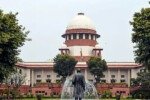NEW DELHI, April 16: In a significant development, the Supreme Court on Wednesday proposed to stay certain key provisions of the contentious Waqf (Amendment) Act, 2025, including the power to denotify properties declared as waqf by courts and inclusion of non-Muslims in central Waqf councils and boards.
The top court proposed to pass the order, which was opposed by the Centre as it sought a detailed hearing before any such interim order.
The hearing relating to 72 petitions against the constitutionality of the Waqf (Amendment) Act, 2025 took place before a bench of Chief Justice Sanjiv Khanna and Justices Sanjay Kumar and K V Viswanathan.
The bench, which will continue with the hearing on Thursday, was miffed over the inclusion of non-Muslims in the central waqf councils and boards and asked the Centre whether it was willing to include Muslims in Hindu religious trusts.
After hearing solicitor general Tushar Mehta for the Centre and senior lawyers including Kapil Sibal, Rajeev Dhavan, Abhishek Singhvi, C U Singh for Muslim bodies and individual petitioners, the CJI proposed to issue the notice and to pass an interim order, saying it will “balance the equities”.
Observing some provisions could have “grave ramifications”, particularly those that potentially undermine judicially recognised waqf properties, the CJI proposed the order.
“The properties declared as waqfs by the courts should not be de-notified, whether they are by waqf-by-wser or waqf by deed while the court is hearing the challenge to the Waqf Amendment Act 2025,” the CJI proposed.
The bench also hinted to stay a provision of the amended law, which says a waqf property will not be treated as waqf during the inquiry of the collector to decide if the property is a government land.
“All members of waqf boards and the central waqf council must be Muslims, except the ex-officio members,” the CJI said.
The bench took note of the provision-wise objections to the Act and expressed reservations on several aspects of the legislation, including the inclusion of non-Muslims in the central waqf council and state waqf boards.
It also objected to empowering district collectors to adjudicate disputes related to waqf properties and the provisions allowing de-notification of properties declared as waqf by competent courts.
“Ordinarily, courts do not interfere at the admission stage when a law is passed. But this case may warrant an exception. If a property declared as waqf by user is denotified, it can have grave ramifications,” the CJI said.
The hearing saw sharp exchanges between the bench and the solicitor general when the judges questioned the logic behind permitting non-Muslims in waqf governance, while a similar reciprocity did not apply to Hindu religious endowments.
“Are you suggesting that Muslims could now be part of Hindu endowment boards as well? Please state it openly,” it told Mehta.
The law officer said not more than two non-Muslim members, apart from ex officio ones, would be included in the waqf council, and offered to state it in an affidavit.
The bench, however, said under the new Act, only eight of the 22 members of the Central Waqf Council would be Muslims.
“If eight are Muslims, two may be judges’ who might not be Muslims. That leaves a majority of non-Muslims. How is this consistent with the religious character of the institution?” the bench asked.
The tensions briefly escalated when the law officer appeared to question the neutrality of the all-Hindu judicial bench.
“When we sit here, we shed our personal identities. For us, all parties are equal before the law. That comparison is entirely misplaced,” the bench said.
“Why not allow non-Hindus in the advisory boards of Hindu temples, then?” it asked.
The bench, which did not issue a formal notice as of now, said it would not consider staying the law at the present stage.
The apex court questioned Mehta on how “waqf by user” could be disallowed as many would not have requisite documents to get such waqfs registered.
“Waqf by user” refers to a practice where a property is recognised as a religious or charitable endowment (waqf) based on its long-term, uninterrupted use for such purposes, even if there isn’t a formal, written declaration of waqf by the owner.
The amended provision states, “Provided that the existing waqf by user properties registered on or before the commencement of the Waqf (Amendment) Act, 2025 as waqf by user will remain as waqf properties except that the property, wholly or in part, is in dispute or is a government property”.
The bench during the hearing asked, “How will you register such waqfs by user? What documents will they have? It will lead to undoing something. Yes, there is some misuse. But there are genuine ones also. I have gone through privy council judgments also. Waqf by user is recognised. If you undo it then it will be a problem. Legislature cannot declare a judgment, order or decree as void. You can only take the basis.”
Mehta submitted there was a large section of Muslims who did not want to be governed by the Waqf Act.
The bench then asked Mehta, “Are you saying that from now on you will allow Muslims to be part of the Hindu endowment boards? Say it openly.”
When a public trust was declared to be a waqf 100 or 200 years ago, it couldn’t suddenly be taken over by the waqf board and declared otherwise, it added.
“You cannot rewrite the past,” the bench said.
Mehta said a joint parliamentary committee had 38 sittings and examined 98.2 lakh memorandums before Parliament’s both houses passed the law.
The CJI wanted the parties to address the court on whether a high court could hear the matter and asked for the crux of their prayers.
“We are not saying there is any bar on SC in hearing, deciding pleas against the law,” he said.
Senior advocate Abhishek Singhvi, who represented some of the petitioners, submitted that Waqf Act would have all India ramifications and pleas should not be referred to the high court.
The Centre notified the Waqf (Amendment) Act, 2025, which received assent of President on April 5. (PTI)












